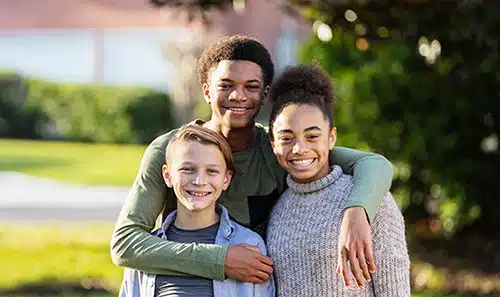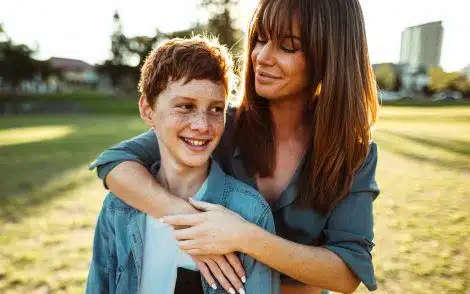
You may be placing a baby for adoption today, but this sweet little baby will grow into an adult with the desire to connect to their history. As a birth parent, you are not just placing a baby for adoption today, but you are laying the foundation for a future adult’s connection to their history.
You might want your baby’s adoptive parents to have specific information about you and your family. You can prepare for these questions by giving your child’s adoptive parents the answers to some common questions adoptees have when they grow older.
Today, we’re sharing how you can help answer these four common questions adoptees ask birth parents:
- What was going through your mind at the time?
- What is my ethnic or racial heritage?
- What is my birth family’s medical background?
- What were my birth parents like?
What Was Going Through Your Mind?
At some point, your child will likely wonder what led you to the decision to place them for adoption. It’s only natural for an adoptee to consider what you were thinking at this time in your life, especially as they reach adulthood, and wonder about the decisions they would have made.
So, how can you lovingly share why you place your child for adoption? One way to give your baby insight is to start writing in a journal now. Write about your thoughts and feelings in the days and weeks surrounding your child’s birth. This journal can someday give your child information from your point of view. Nobody can share your thoughts and feelings the same way you can.
Another way you could explain your decision is to write a letter or email or tape a selfie video where you can explain your decision. As you write a letter to your child, you can explain to your child that you wanted to provide them with two loving parents, financial stability, and more opportunities.
“I know my birth mother wanted me to be happy and successful in life…but how? Did she want me to get married, have kids, serve others, or explore the world maybe? As she chose adoption, I would love to know what kind of dreams and hopes she had for me with my adoptive parents,” says Blake, an adoptee.
Share with your child why you chose adoption, and that it was done out of your love for them. You can also tell them why you selected the adoptive parents that you did and the opportunities you wanted them to have.
What Is My Ethnic (or Racial) Heritage?
Many children will grow up with questions about their heritage, such as, “Where did I come from?”
While these questions may linger, open adoption means that you can keep in contact with your child and their adoptive parents. You can see your child again and develop a meaningful, positive relationship with your child. With open adoption, children no longer have to wonder about a faceless, secret parent they have never met or heard of.
Your child will one day want to know about their ethnic and racial heritage. Not only will they want to know about your background, but they will also want to know about their birth father’s heritage.
If you choose adoption for your baby, you can help a lot by gathering as much information about your child’s birth father as possible. Even if you choose open adoption and have a strong relationship with your child’s adoptive family years from now, your child’s birth father might not have this same relationship.
One way to tell your child about their heritage is to write a letter they can open when they’re older. With this letter, you can include photos of each side of the child’s family. And so your child can see what their parents looked like when they were born, include pictures of yourself and your baby’s father, if possible.
Photos are also good because they show your child where they get different physical features. Does your baby have his birth father’s smile? His birth mother’s nose? Knowing where these features come from clears up questions adopted children often have.
Shares one adult adoptee, Kendra, “For some adoptees, seeing a physical reflection of yourself in another person is important. Having pictures of what your birth family looks like is nice because when I had children, I kept wondering who they would look like.”
What Is My Birth Family’s Medical Background?
When your baby grows up, they are sure to have questions about their physical well-being. When your child goes to the doctor, they will need to fill out paperwork that asks about their family history of health conditions. Their doctor will ask whether they have a family history of heart disease, diabetes, cancer, and mental health issues.
By providing your child with their birth family’s medical background, you are empowering them to make informed decisions about their health. This information could potentially save your child’s life, making your proactive approach a significant contribution to their well-being.
What Were My Birth Parents Like?
There are some things that adoptees want to know about their birth family to understand their genetics and ethnicity. Many adoptees want answers to basic questions, like:
- Where did you grow up?
- When you were a child, what did you want to be when you grew up?
- Where did you go to school? How did you do?
- What was it like growing up in your family?
- Do you follow a certain religion?
- What was your first job?
- What are your favorite foods?
- What type of music do you like?
- What about your first car?
- Did any of my ancestors join the military?
- What are my birth grandparents like?
Sharing your personal history isn’t just about providing information; it’s about encouraging a sense of connection and appreciation. By understanding their personal history, your child can make sense of their own traits and characteristics, recognizing and appreciating the unique traits within themselves.
You can provide these answers to your child in a write a letter, email, or make a video. In, you can share about your hobbies, background, and strengths so your child can compare them to their own. By making this connection, your child will also discover their own story and identity.
In this letter, you can also allow your child to get to know other members of your family, including their birth father. In fact, your baby’s father may even write his own letter to his child.
Questions Adoptees Ask Birth Parents
Many adults who were adopted have questions about their birth parents. Children ask questions too, but they are often more basic. The questions evolve and may become more difficult as they grow older, but adoptees really just want to know where they come from. They want to know about their heritage and build a sense of self as they grow older.
Adoption is a complex issue for everybody involved. Not only do you have a lot of decisions in the future, but you are also dealing with the fact that your child might have a lot of questions about you. You made a loving choice to place your child with a family that provides unconditional love for your baby. That doesn’t mean that your love for them isn’t also unconditional. You can share your love with your child through photos, letters, videos, and other ways to communicate in the coming years.
Editor’s Note: This article was originally published on February 14, 2020, and has since been updated.
As Vice President of Lifetime Adoption, Heather Featherston holds an MBA and is passionate about working with those facing adoption, pregnancy, and parenting issues. Heather has conducted training for birth parent advocates, spoken to professional groups, and has appeared on television and radio to discuss the multiple aspects of adoption. She has provided one-on-one support to women and hopeful adoptive parents working through adoption decisions.
Since 2002, she has been helping pregnant women and others in crisis to learn more about adoption. Heather also trains and speaks nationwide to pregnancy clinics to effectively meet the needs of women who want to explore adoption for their child. Today, she continues to address the concerns women have about adoption and supports the needs of women who choose adoption for their child.
As a published author of the book Called to Adoption, Featherston loves to see God’s hand at work every day as she helps children and families come together through adoption.






0 Comments